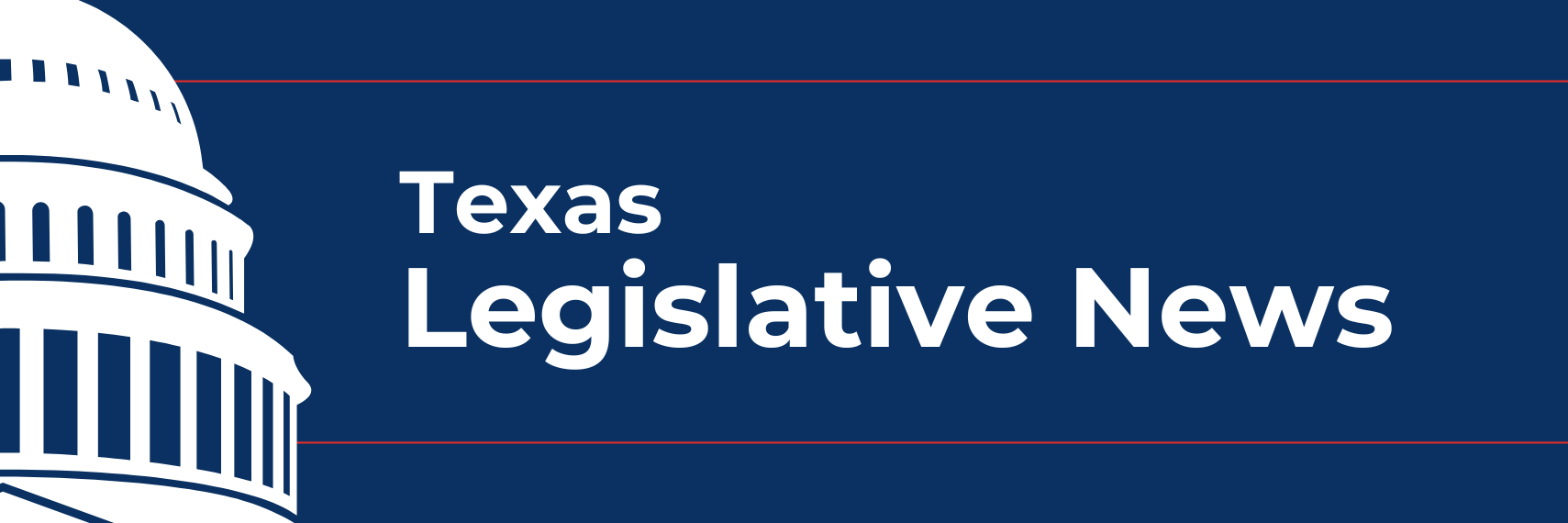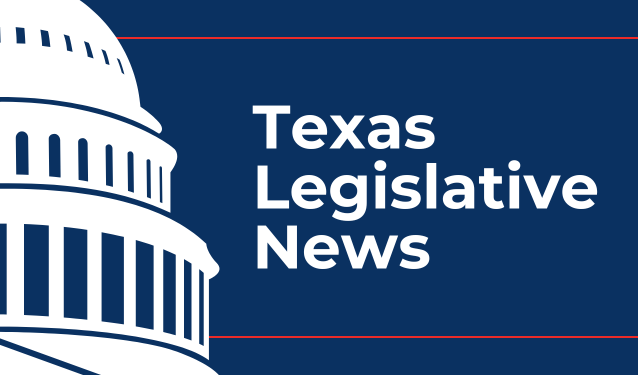

Table of Contents
Welcome to the latest edition of Texas Legislative News for the 89th Texas Legislature. In this regular feature, we provide information on disability-related issues and bills under consideration at the State Capitol. We also explain how lawmakers conduct business, and we share details on upcoming TCDD events.
With the legislative session now over, we’re taking stock of what happened in the session’s final days and sharing outcomes that might impact people with intellectual and developmental disabilities (IDD). This week, we focus on early childhood and inclusive education.
Legislative Recap on Early Childhood and Inclusive Education
TCDD adopted the following public policy priority on early childhood and inclusive education for the legislative session: “Ensure children with disabilities ages 0-22 receive necessary services to promote healthy growth and development to support long-term success and independence. Children with disabilities in Texas deserve access to quality care and education such as inclusive childcare, therapy and case management services, special education services, and transition planning, which meet or exceed federal standards to increase childhood and long-term outcomes.”
Here are some of the proposed measures we tracked related to this priority.
School Finance and Special Education Funding
During the session, lawmakers passed two major bills that reshaped public school finance and special education funding:
- House Bill (HB) 2, by Rep. Brad Buckley, invested an additional $8.5 billion in Texas public education. This included a $55 increase to the basic allotment; across-the-board raises for teachers and school staff; and targeted funding for special education, early childhood, school safety, and grants for special education teacher preparation. A coalition of organizations, including The Arc of Texas and Disability Rights Texas, advocated throughout the session for meaningful investments in special education. The final version of HB 2 dedicated $1.3 billion to special education programs, including a $1,000 reimbursement to schools for each Full Individual and Initial Evaluation for special education.
- Senate Bill (SB) 568, by Sen. Paul Bettencourt, overhauled the state’s special education funding model by replacing placement-based funding with a tiered, service-intensity approach. The bill also added targeted reimbursements for transportation as well as outcome-based bonuses for districts that improve special education results. SB 568 was highlighted as a TCDD Bill of the Week.
Private School Vouchers
SB 2, by Sen. Brandon Creighton, passed and was signed into law. It establishes a statewide Education Savings Account (ESA) program that allows eligible families to use public funds for private school tuition, homeschooling, and related educational expenses.
Going into the session, Gov. Greg Abbott and Lt. Gov. Dan Patrick both identified the creation of an ESA program as one of their top legislative priorities. Disability advocates expressed concerns about using public dollars to pay for private schools, as outlined in this TCDD informational one-pager (PDF). The final version of SB 2 addressed few of the advocates’ concerns.
In the state’s new ESA program:
- Eligible students may receive $10,000 per year for private school tuition.
- Students with disabilities may receive up to $30,000 annually to cover additional costs such as therapies and specialized services.
- Homeschooling families may receive a base amount of $2,000 per year, which can increase to $4,500 for students with disabilities, reflecting the extra resources needed to support their education at home.
When funding is limited, the program will prioritize students with disabilities, low-income families, and siblings of current ESA recipients.
Families who use ESA funds for private or homeschooling options forfeit federal special education rights and protections, including access to an Individualized Education Program (IEP) and due process available in public schools.
Under SB 2, public schools will receive a $1,000 reimbursement for each Full Individual and Initial Evaluation conducted for students who transfer out of the public school system to participate in the ESA program. This payment will help offset the cost of evaluating students leaving public schools for private or homeschool options.
To help you understand the options and impact of the new program, TCDD and The Arc of Texas collaborated to create a one-pager, titled Vouchers and Students with Disabilities (PDF). Please use this document as a reference and share it with others in your network.
LIDDA Referrals
Lawmakers passed HB 1188, by Rep. Christian Manuel, which requires schools to refer students who receive special education services to a local intellectual and developmental disability authority (LIDDA) for additional services and public benefits. This referral applies to students who have or are suspected of having IDD at the time of identification, rather than waiting until a student’s transition planning begins at age 14. The earlier referral should help families access critical services sooner, leading to stronger long-term outcomes.
The bill was named the “Caytlin Handley Act” in honor of a young woman whose late LIDDA referral and 15-year wait on the state’s Medicaid waiver interest list demonstrated the need for the legislation. HB 1188 was featured as a TCDD Bill of the Week.
Student Discipline
HB 6, by Rep. Jeff Leach, introduced significant changes to student discipline policies in public schools. The bill increased the maximum allowable duration for in-school suspension to 10 days. Additionally, HB 6 provided funding for virtual disciplinary alternative education program (DAEP) placements, offering more flexible disciplinary options.
The reforms aimed to enhance discipline management and expand access to telehealth mental health services in public schools. Disability Rights Texas and The Arc of Texas collaborated closely with the bill’s author to include due process and other procedural safeguards in the legislation to help ensure fair treatment and uphold the legal rights of students with disabilities.
Early Education and Child Care
Lawmakers filed several early childhood and child care bills during the session with varying degrees of success.
One notable bill that passed was HB 2310, by Rep. Claudia Ordaz, which directed the Texas Education Agency (TEA) to develop a strategic plan to expand and improve early learning opportunities for young children with disabilities. The plan must address access, inclusion, and quality standards across early childhood programs. HB 2310 aimed to build a more coordinated, statewide approach to serving children with disabilities in their earliest years. The bill was featured as a TCDD Bill of the Week and went into effect immediately upon its signature into law on June 20.
HB 2 — the bill we previously mentioned in the School Finance and Special Education Funding section — made key investments in early education, including expanding free pre-K access, strengthening full-day options, and building statewide infrastructure to improve access and raise program standards.
One of the bills that failed to make it through the legislative process was HB 175, by Rep. Mary González, which would have established optional certifications and a grant program for child care providers serving children with disabilities. After passing in the House, the bill was not referred to a Senate committee for further consideration. HB 175 was featured as a TCDD Bill of the Week.
Emergency Preparedness
SB 57, by Sen. Judith Zaffirini, will require students with disabilities to be included in their school’s emergency planning. The bill ensured that individualized accommodations are integrated into safety drills, evacuations, and lockdown procedures so students with disabilities receive the support they need during emergencies.
Additional K-12 Legislation
A few more notable bills that didn’t pass during the session included the following:
- HB 2292, by Rep. Alma Allen, would have banned school-initiated, undocumented early pickups.
- HB 2875, by Rep. Suleman Lalani, would have allowed school districts to develop policies to address eloping behavior by students with autism or IDD. “Eloping” was defined in the bill as “the act of leaving a safe or supervised area unexpectedly and without notice, often as a result of a sensory trigger, anxiety, or an inability to communicate effectively.”
- HB 3048, by Rep. Alma Allen, as well as its companion, SB 2612, by Sen. Royce West, would have required the state’s public school social studies curricula to include instruction related to the history of people with disabilities.
- SB 1447, by Sen. José Menéndez, would have directed TEA to adopt standards related to using assistive technology as needed for individualized special education programs and 504 plans.
Higher Education
According to a TCDD position statement: “Students with disabilities deserve the preparation and support necessary to successfully transition into higher education and, ultimately, meaningful employment postgraduation. … While participating in higher education, students with disabilities should have the opportunity to access campus life alongside their nondisabled peers and receive meaningful evidence of their academic achievements upon completion of their programs.”
Two notable bills relating to postsecondary opportunities for students with disabilities passed into law:
- SB 769, by Sen. José Menéndez, requires the state to produce a comprehensive report on the enrollment, retention, and success of students with disabilities in Texas higher education institutions. The bill aimed to improve transparency and inform policy decisions that support the students’ academic achievement and inclusion. By collecting and analyzing this data, Texas can better address barriers and enhance services for students with disabilities pursuing postsecondary education. SB 769 was featured as a TCDD Bill of the Week.
- HB 2081, by Rep. John Bucy III, establishes the Building Better Futures Program to support educational and occupational skills training and support services for students with IDD at public and private institutions of higher education. The bill aimed to promote greater inclusion and improve long-term outcomes for this underserved population. HB 2081 was also featured as a TCDD Bill of the Week.
TCDD Recap on Disability Policy
TCDD hosted a Disability Policy Academy on June 25 titled “A Capitol Recap: Disability Policy in the 89th Legislature.” Disability policy experts provided an overview of new disability-related laws and issues that remain unaddressed. The webinar’s slideshow can be found here.Stay Informed
Stay up to date on how lawmakers address disability issues by following us on Facebook, X, Instagram, and LinkedIn. You can also visit our website to learn more about our public policy engagement and find resources to support your own legislative advocacy.
